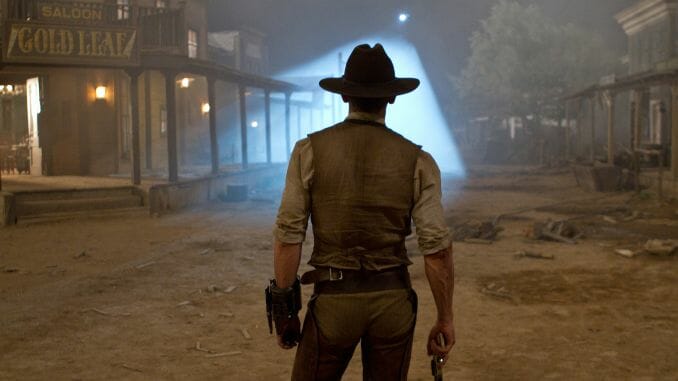How Cowboys & Aliens Became an Understandably Forgotten Object

The cast boasted Daniel Craig, Harrison Ford, Olivia Wilde, Paul Dano, Sam Rockwell and Walton Goggins. Ron Howard and Steven Spielberg were on board as producer and executive producer respectively. Damon Lindleof was one of the writers. Jon Favreau was in the director’s chair. And all that’s before you even get to the main attraction: Cowboys! AND! Aliens! With the deck stacked so absurdly in its favor, with all the possible ingredients to make the perfect summer blockbuster, how did it go so wrong?
The plot: It’s 1873, and amnesiac cowboy Jake Lonergan (Daniel Craig) arrives in the town of Absolution with a strange metal device on his wrist and no idea how it, or he, got there. Just as he’s getting to know the citizens—including the mysterious Ella Swenson (Olivia Wilde) and cold-hearted cattle baron Woodrow Dolarhyde (Harrison Ford)—a phalanx of aliens attacks Absolution, abducting some of the townsfolk. The rest of the movie follows Lonergan and Dolarhyde as they form a posse, track down the aliens and go get their people back.
Sure, Cowboys & Aliens has a title that sounds like a ridiculous comic book adventure (creator Scott Mitchell Rosenberg first pitched his idea as a feature film and a graphic novel simultaneously, all the way back in 1997), but from the outset, the production team was determined that their movie be viewed with the utmost gravity. Amongst many other films, they cited High Noon, Unforgiven and The Searchers as references. This was to be a serious work, a solemn reinvention of the classical western—that just happened to also feature aliens.
-

-

-

-

-

-

-

-

-

-

-

-

-

-

-

-

-

-

-

-

-

-

-

-

-

-

-

-

-

-

-

-

-

-

-

-

-

-

-

-








































